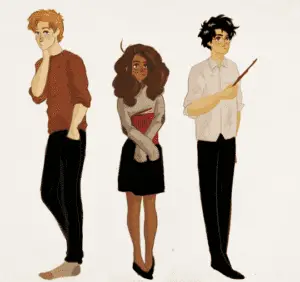Presented by “Harry Potter and the Reread Project”
Our last Harry Potter Reread ended with Harry’s obsession with what Draco Malfoy was up to slowly blossoming after he spent a few weeks with the Dursleys and then helped Dumbledore manipulate Slughorn into returning to Hogwarts. As you might remember, Harry’s obsession led him to sneak into Draco’s train compartment after a lunch with Slughorn on the Hogwarts Express to eavesdrop on him where Draco discovered him, magically hexed him, broke his nose and tried to send him back to London. Luckily for him, Harry was discovered by Tonks and could return to Hogwarts, where he discovered the old potion’s book that belonged to the titular Half-Blood Prince, started private lessons with Dumbledore, saw one of his classmates be cursed and, figuratively speaking, drowned in school work.
Misleading Clues
It’s unsurprising, of course, that Harry believes that Draco is a Death Eater – after all, there is a bunch of evidence pointing towards it, including Harry overhearing Draco admit it. And especially after Draco humiliates him on the train, it makes perfect sense that Harry wants to prove that he is right as well as get back at Draco.
At the same time, it’s also makes sense that no one believes Harry: the idea that Voldemort could recruit a sixteen year old is a pretty scary one, and Draco is well-known for being a show off. There is also a bunch of evidence against Draco being up to anything sketchy, like the fact that he couldn’t have transported something dark into Hogwarts but nothing was found at the Malfoy residence either. Additionally, everything points away from Draco being responsible for Katie Bell coming into contact with a cursed necklace that put her into the hospital.
What doesn’t entirely make sense is that despite the overwhelming evidence to the contrary, Harry remains utterly convinced that he is right. It’s interesting because it essentially shows that he has stopped caring what most people think about his behaviour. He had plenty of reasons to develop a thick skin, of course, but when it comes to Draco, it seems more like pigheadedness than anything else. One could also assume that he’s focusing on Draco as much as he is to distract himself from Sirius and because he now especially feels like he has to prevent Death Eater attacks. Unfortunately, there has been little so far to actually support this reading of the situation.
Of course, the fact that Draco seems extremely innocent to most of the characters – and first time readers of the book as well – shows JKR’s ability to write a misleading story and still piece it back together in a way that makes perfect sense in the end. It’s a skill she has shown in the Harry Potter books before, like in Prisoner of Azkaban, but apart from Snape’s story, I think she does it best with making Draco seem innocent while he’s trying to kill Dumbledore.
Budding Romances
Another thing that starts blossoming during Half-Blood Prince are the two most significant romances of the series. I’m speaking, of course, about the ones between Harry and Ginny, and Ron and Hermione. Both of those relationships have divided fans, but apart from the fact that I’ve always shipped Hermione specifically with almost every guy in the series I ever thought was cute – yes, it was a way of self-inserting without creating a Mary Sue OC – I never really thought much about them. That Ron and Hermione and Harry and Ginny ended up with each other was fine with me; it almost seemed like the most logical conclusion.
That Ron and Hermione had feelings for each other had been hinted at since Goblet of Fire, as we all might remember. Ron gave her a hard time for going to the Yule Ball with Krum because it was “fraternizing with the enemy”, though it was actually all about his misplaced jealousy, and there have been recurring hints of that jealousy ever since. When he returns to Hogwarts, though, he starts to flirt with Lavender Brown in the hallways and before his Keeper try outs for the Gryffindor Quidditch team but still reacts jealously when Hermione, for example, tells Harry that he’s “fanciable”.
The fact that so far, most of their romance has been hinted at through jealousy is annoying as well as kind of concerning to me. Jealousy is a perfectly normal emotion, of course, but it’s ridiculous to snap at someone you’ve barely flirted with when they express interest in someone else. It’s a shame that Ron and Hermione are rarely shown to be actually affectionate and flirty with one another and it’s an even bigger shame that it’s only going to get worse as Half-Blood Prince progresses.

What I noticed during the Half Blood Prince reread was the fact that there were small hints at Harry’s blossoming feelings for Ginny before he started to feel jealous about her dating Dean, for example this:
This left Harry, Ron and Hermione to share a table with Ernie. They chose the one nearest a gold-coloured cauldron that was emitting one of the most seductive scents Harry had ever inhaled: somehow it reminded him simultaneously of treacle tart, the woody smell of a broomstick handle and something flowery he thought he might have smelled at the Burrow. […]
‘Hang on,’ said a voice close by Harry’s left ear and he caught a sudden waft of that flowery smell he had picked up in Slughorn’s dungeon. He looked round and saw that Ginny had joined them.
Harry also wants to spend more time with Ginny than ever before and, for example, invites her to meet up with him and the other two in Hogsmeade and is afterwards annoyed when she doesn’t make it. Those hints are, of course, fairly small and easily overlooked – I never realised that Amortentia smelt like Ginny for Harry until now. But both budding feelings and the beginnings of the jealousy he feels later on are already there.
Fundamental Flaws
What isn’t there as much as it was before any more is the criticism of the Wizarding World and the Ministry. There’s an incident where Hermione reads about Stan Shunpike, conductor of the Knight’s Bus, being arrested because he was overheard bragging about knowing secret Death Eater plans. It’s clear to the Trio that Stan is just making stuff up to seem more important than he is, as they overheard him do at the Quidditch World Cup.
The Ministry arresting him anyway but failing to make any progress on the arrests of actual Death Eaters is clearly meant to show that the issue of incompetency runs deeper than just Fudge. However, in comparison to Order of the Phoenix, it has only been background noise so far which makes the issue feel unresolved and almost unacknowledged.
Much like Order of the Phoenix had the two main plot strands of the struggle against the Ministry’s manipulation and the fight against Voldemort itself as well as subplot strands, Half-Blood Prince has, in my opinion, multiple subplots (the romances and the Half-Blood Prince’s book, for example) as well as two main plots: Dumbledore and Harry’s research into Voldemort’s past and the Horcruxes and the attacks on Hogwarts students coupled with Harry’s obsession with Draco.
Unfortunately, the exploration of the Ministry’s flaws becomes just another subplot among many and does not get the attention such a fundamental flaw should get.
Sympathy for the Villains
What I do love about this part of Half-Blood Prince is what we learn about Voldemort’s past and family. The fact that Voldemort essentially grew up an odd, outsider child in an unpleasant orphanage due to circumstances absolutely beyond his control makes it hard not to sympathise a bit with him, as Harry does, especially because his mother probably could have saved her own life. But I especially like what we learn about Voldemort’s family, birth and childhood because it essentially shows that he was a product of some of the worst aspects of Wizarding society.
As you might remember, Voldemort’s mother was Merope Gaunt, the only daughter of Marvolo Gaunt, a direct descendant of Slytherin and the Peverell brothers, two old pureblood families. Due to their extreme belief in pureblood supremacy, they regularly married their own cousins which led to a tendency to be emotionally and psychologically unstable and violent. Although the family used to be rich, by the time Merope grew up, they were living in abject poverty but still with a sense of entitlement and superiority due to their heritage. Marvolo was irascible, emotionally and probably physically abusive towards Merope and clearly favoured his son Morfin, who had just as much of an explosive temper as his father. Her magical abilities were seemingly not especially remarkable

from the beginning but further atrophied under her father’s control or simply never developed properly because of the abuse.
It’s easy to see how Merope’s awful situation was largely caused by a sense of pureblood supremacy and the way magical abilities are essentially determine a person’s worth. The later is a widespread way of seeing people even among “good” wizards like the Weasleys, like the Weasleys, who are embarrassed by their distant Squib relative, and the Longbottoms, who again and again put Neville in danger to awaken his magical abilities.
But in my opinion, there’s an additional flaw of the Wizarding world that worsened the situation of the Gaunt family: the lack of both a welfare system and something like child protective services. The fact that the Gaunts live in abject poverty is not just due to their own bad spending habits but also the fact that there just isn’t any kind of social security net for witches and wizards. Of course, this lack could be due to the fact that JKR simply didn’t want to think about how such a system would work, but considering her own experiences with poverty and a lack of support, it’s easy to assume that she was making an implicit point about the necessity of the welfare state.
Merope herself is a character that I also feel immense sympathy for. Not only was she an abuse victim but also, quite frankly, pretty ugly. Tom Riddle, the handsome son of the village squire, seems to have been one of the few good things around her. She seems to have focused all her affection and longing onto him, maybe even seen him as a way to escape her abusive family and poverty. Considering that love potions seem to be seen as a fairly normal part of Wizarding life – so normal that the Weasley twins manufacture and sell them and that Slughorn teaches them in class – it’s also unsurprising that she saw it as not at all gross to give him one.
When he understandably left her after she stopped giving him said love potion, Merope essentially lost what she saw as the only good thing in her life and only had the choice of dying, returning to her abusive family and trying to find her way in the Wizarding world without any money or friends but with a small child. Again it’s unsurprising that after decades of abuse, she did not have the strength to stay alive. I feel like although the fact that she used a love potion and thus coerced Riddle into a relationship with her is morally unacceptable, she’s primarily a tragic product of her society and environment.
Nature vs Nurture
Of course JKR is making an excellent case for the nurture side of the “nature vs nurture” debate with her portrayal of Merope. It’s a debate that has been raging for centuries and that circles around the question what’s more important for how a human being turns out: their genes and biology or their environment and education. What she’s trying to say about Voldemort himself seems more complicated to me.
When Dumbledore goes to see the eleven year old Tom Riddle jr. in the orphanage, it’s clear that he’s already a quite cruel child who bullies the other children. One could assume that he was born that way. At the same time, it’s stated that he’s always been odd, which might have made him an outsider, and that the orphanage is “a grim place in which to grow up”, even though the children look “reasonably well-cared-for”. Although Riddle wasn’t abused, JKR makes it clear that he also wasn’t loved or cared for and probably received little moral education.
When she was asked about the significance of Voldemort being conceived while Tom Riddle was under the influence of a love potion, JKR said
“It was a symbolic way of showing that he came from a loveless union – but of course, everything would have changed if Merope had survived and raised him herself and loved him. The enchantment under which Tom Riddle fathered Voldemort is important because it shows coercion, and there can’t be many more prejudicial ways to enter the world than as the result of such a union.”
JKR makes it clear that she is aware that children born into a coercive or abusive relationship are at a disadvantage compared to children born into healthy relationships but that she also believes that being raised by someone who loves you can change everything. Again, she makes it clear that Voldemort wasn’t born evil and that he developed into someone evil because of the loveless environment he grew up in.
What’s interesting is that it corresponds well with Snape, who also grew up in an abusive household and was then bullied throughout school, and is the opposite of Harry, who was already a fundamentally nice person despite being abused by the Dursleys when he came to Hogwarts. The three characters essentially show three different people someone who grew up in an abusive household can become.
A Weird Atmosphere
Half-Blood Prince has always been the Harry Potter book I’ve felt the most “meh” about and now that I’m rereading it, I definitely know why. In my first post about it, I wrote that I enjoy how JKR portrays a world at war and the tense atmosphere that that creates. Unfortunately, a lot of that tension gets lost once Harry returns to Hogwarts and the focus of most of the book shifts back to his everyday school life.

Of course JKR does remind us that the world outside of Hogwarts is at war: Ron has, for example, developed the slightly heartbreaking habit of asking Hermione whether anyone they know has died whenever she reads the prophet, but apart from a comparably short scene where the Trio discusses Stan Shunpikes arrest, Hermione reminds Harry and Ron that parents are trying to take their children out of the school and we learn that Hannah Abbott’s mother was found dead, Katie Bell being attacked and Harry’s lessons with Dumbledore, there isn’t much reminding us that there is now an actual open war going on.
On the one hand, that makes sense: Hogwarts is supposed to be a far safer place than anywhere else in the Wizarding world so naturally, the effects of the war won’t be felt as strongly there as they would be on the outside. And life goes on, even during war, so Harry worrying about his classes, homework, Quidditch and romantic relationships certainly works.
On the other hand, the tonal shift doesn’t work. There is no sense of imminent danger, even after Katie is attacked, and because what is happening outside of Hogwarts is rarely mentioned, there is also no sense of the fate of the Wizarding World hanging in the balance. It feels a lot more like a regular school year for Harry – more like Chamber of Secrets or Prisoner of Azkaban than a society at war. Then there’s also the fact that Sirius is rarely mentioned and that the conflict with the Ministry moves to the background so much.
The end of Order of the Phoenix fundamentally upset a lot of things in Harry’s life as well as in the Wizarding World: the only adult that felt like an actual family member to Harry was dead and Voldemort was officially back and the Ministry at war with him. But after about twelve chapters of Half-Blood Prince, it mostly feels like everything is back to normal.
Next time: Harry overhears some serious claims as Ron gets sucked into quite another serious matter.

